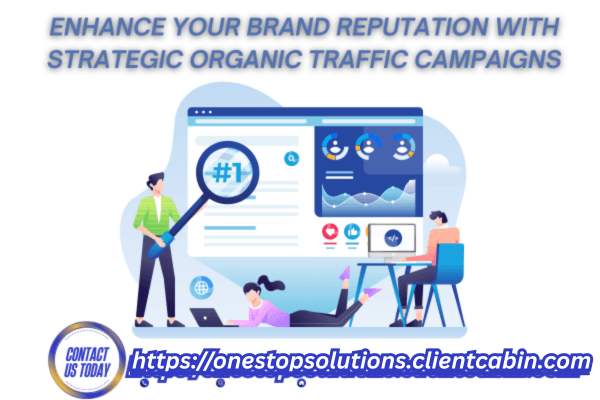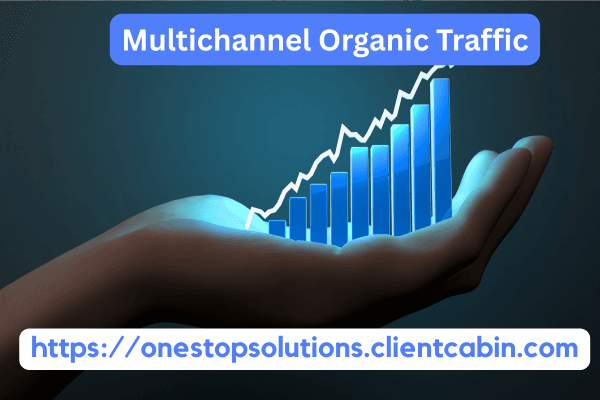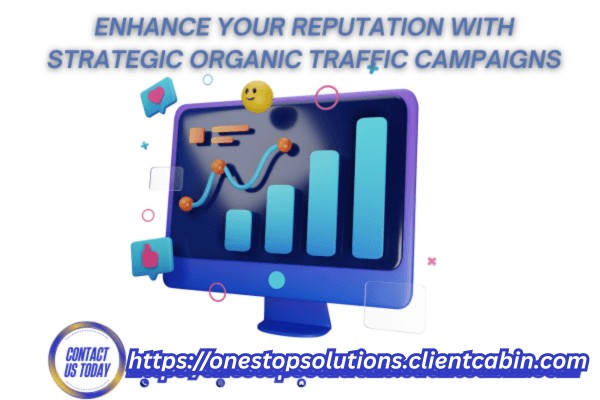Boosting Brand Reputation Growth with Organic Traffic
Brand reputation builds trust and is a crucial factor in business success. It influences sales, customer loyalty, and investor confidence. It therefore becomes essential for any business that wants to thrive in today’s competitive market, to have a brand focused strategy in place.
One effective way to enhance your brand reputation is by leveraging organic traffic. By doing so, you not only increase visibility but also build trust with your audience. Let’s dive into how you can boost your brand reputation through organic traffic, step by step.
Kickstarting Your Brand Reputation with Organic Traffic
Every brand desires recognition and trust. These are the pillars of a strong brand reputation. However, achieving this isn’t always straightforward. The key lies in understanding how organic traffic can be a powerful tool in building and sustaining your brand’s reputation.
Why Brand Reputation Matters
A solid brand reputation isn’t just about looking good; it’s about building trust with your customers. When people trust your brand, they’re more likely to choose your products or services over others. This trust translates into customer loyalty, which is invaluable for long-term success.
Moreover, a strong brand reputation can lead to increased word-of-mouth referrals. Customers who have positive experiences with your brand are more likely to recommend you to others. This kind of organic growth is priceless and can significantly boost your brand’s visibility and credibility.
The Impact of Organic Traffic on Brand Growth
Organic traffic refers to the visitors who land on your website through unpaid search results. Unlike paid advertising, organic traffic is sustainable and cost-effective. It’s driven by search engine optimization (SEO) strategies that improve your website’s visibility on search engines like Google.
When your brand consistently appears in search results, it creates a cycle of trust and familiarity. Users begin to associate your brand with credibility and authority in your industry. This perception can significantly enhance your brand’s reputation, leading to increased customer engagement and conversion rates.

Effective Strategies to Increase Organic Traffic
Boosting your brand’s reputation through organic traffic requires a strategic approach. Here are some effective strategies to get you started:
Optimize for Search Engines
Search engine optimization is the foundation of driving organic traffic. It involves optimizing your website’s content, structure, and technical aspects to improve its visibility on search engines. Here are some key steps to optimize your website for SEO:
- Keyword Research: Identify relevant keywords that your target audience is searching for. Use tools like Google Keyword Planner to find high-traffic, low-competition keywords.
- On-Page SEO: Optimize your website’s title tags, meta descriptions, headers, and content with relevant keywords. Ensure your website is mobile-friendly and loads quickly.
- Technical SEO: Improve your website’s technical aspects, such as site speed, mobile responsiveness, and secure connections (HTTPS). These factors contribute to better search engine rankings.
Create High-Quality Content
Content is king when it comes to building a strong brand reputation. Creating high-quality, informative, and engaging content establishes your brand as an authority in your industry. Here’s how to create content that resonates with your audience:
- Understand Your Audience: Know who your target audience is and what they care about. Create content that addresses their pain points and provides solutions.
- Be Consistent: Regularly publish fresh and relevant content. Consistency keeps your audience engaged and signals to search engines that your website is active.
- Use Various Formats: Diversify your content by using different formats, such as blog posts, videos, infographics, and podcasts. This keeps your audience interested and engaged.
Utilize Social Media Platforms
Social media platforms offer a powerful way to amplify your brand’s reach and reputation. By leveraging social media, you can connect with your audience on a personal level and build a community around your brand. Here’s how to make the most of social media:
- Engage with Your Audience: Respond to comments, messages, and mentions promptly. Show your audience that you value their feedback and are attentive to their needs.
- Share Valuable Content: Share your content on social media platforms to reach a wider audience. Encourage your followers to share your content with their networks.
- Collaborate with Influencers: Partner with influencers in your industry to expand your brand’s reach. Influencers can introduce your brand to new audiences and boost your credibility.
Implement Content Marketing Techniques
Content marketing is a strategic approach focused on creating and distributing valuable content to attract and retain a clearly defined audience. It’s an essential component of boosting your brand’s reputation. Here’s how to implement content marketing effectively:
- Develop a Content Strategy: Outline your content goals, target audience, and content types. Create a content calendar to plan and schedule your content.
- Promote Your Content: Use various channels, such as email marketing, social media, and guest blogging, to promote your content and reach a broader audience.
- Measure and Analyze Results: Track your content’s performance using analytics tools. Monitor metrics such as page views, engagement rates, and conversion rates to assess your content’s effectiveness.
Case Study: Company X increased their organic traffic by 200% in six months by focusing on SEO and content marketing strategies. They optimized their website for search engines, created high-quality content, and leveraged social media to amplify their reach. As a result, their brand reputation improved significantly, leading to increased customer trust and loyalty.
Leverage Backlink Building
Backlinks are links from other websites that point to your site. They are a crucial factor in improving your website’s authority and search engine rankings. Here’s how to build high-quality backlinks:
- Guest Blogging: Write guest posts for reputable websites in your industry. Include a link back to your website in your author bio or within the content.
- Build Relationships: Connect with other bloggers and industry experts. Collaborate on content or participate in interviews to earn backlinks.
- Create Shareable Content: Develop content that is valuable and shareable, such as infographics or comprehensive guides. Encourage others to link to your content as a resource.
By implementing these strategies, you can significantly boost your brand’s reputation and trust with your audience. Remember, building a strong brand reputation takes time and effort, but the rewards are well worth it.
Lessons from Successful Brand Reputation Growth
Understanding real-world examples of how brands have successfully boosted their reputation through organic traffic can provide invaluable insights. Let’s explore some notable case studies that demonstrate effective strategies and their outcomes.
Each of these companies faced unique challenges but overcame them by leveraging organic traffic to enhance their brand reputation. Their stories offer practical lessons that can be applied to your brand’s growth journey.
By examining these cases, we can identify common strategies and tactics that contributed to their success. These insights can guide you in implementing similar approaches for your brand, such as learning how to boost local search for increased visibility.
Company A: A Search Success Story
Company A, a mid-sized e-commerce business, struggled with low visibility and brand recognition. To tackle this, they focused on optimizing their website for search engines. They conducted thorough keyword research and revamped their on-page SEO elements. Additionally, they prioritized technical SEO improvements, ensuring their site was mobile-friendly and fast-loading.
As a result, Company A experienced a 150% increase in organic traffic within a year. This boost in visibility not only improved their search rankings but also enhanced their brand reputation. Customers began to associate Company A with reliability and expertise, leading to increased trust and loyalty.
Company B: Content that Captivates
Company B, a content-driven business, recognized the power of high-quality content in building brand reputation. They invested in creating engaging and informative content that resonated with their target audience. By understanding their audience’s needs and preferences, they produced content that addressed relevant topics and provided valuable insights.
Besides that, Company B utilized social media platforms to amplify their content’s reach. They actively engaged with their audience, responding to comments and encouraging discussions. This approach not only increased their content’s visibility but also strengthened their brand’s reputation as a thought leader in their industry.
Common Threads in Successful Strategies
While Company A and Company B employed different strategies, there are common threads that contributed to their success. Both companies prioritized understanding their audience and tailoring their efforts to meet their needs. They also focused on consistent, high-quality content creation and effective use of SEO techniques.
Moreover, they leveraged social media to connect with their audience on a personal level, fostering a sense of community and trust. These strategies are not only effective but also sustainable, providing long-term benefits for brand reputation growth.
Measuring and Analyzing Brand Reputation Success
To ensure your brand’s growth efforts are on the right track, it’s essential to measure and analyze your success. By tracking key metrics, you can gain insights into what’s working and identify areas for improvement. This data-driven approach allows you to make informed decisions and optimize your strategies.
Let’s explore some crucial metrics and tools that can help you assess your brand’s reputation and growth through organic traffic.
Tracking SEO Metrics
SEO metrics provide valuable insights into your website’s performance and visibility on search engines. Key metrics to track include:
- Organic Traffic: Monitor the number of visitors coming to your website through organic search results. An increase in organic traffic indicates improved visibility and effectiveness of your SEO efforts.
- Keyword Rankings: Track the rankings of your target keywords to assess your website’s visibility in search results. Higher rankings indicate better optimization and increased brand exposure.
- Backlinks: Analyze the quantity and quality of backlinks pointing to your website. High-quality backlinks from reputable sources enhance your site’s authority and search engine rankings.
Tools like Google Analytics and SEMrush can help you track these metrics and gain valuable insights into your SEO performance.
Understanding Engagement Rates
Engagement rates reflect how well your audience interacts with your content. High engagement indicates that your content resonates with your audience and builds trust. Key engagement metrics to monitor include: brand awareness.
- Page Views: Track the number of views each page on your website receives. This metric helps you identify popular content and topics that resonate with your audience.
- Time on Page: Measure the average time visitors spend on each page. Longer time on page suggests that your content is engaging and valuable.
- Bounce Rate: Monitor the percentage of visitors who leave your website after viewing only one page. A high bounce rate may indicate that your content needs improvement or isn’t meeting your audience’s expectations.
Evaluating Conversion Rates
Conversion rates measure the effectiveness of your website in turning visitors into customers. Tracking conversion rates helps you assess the success of your strategies and identify areas for improvement. Key conversion metrics include:
- Lead Generation: Track the number of leads generated through your website. This metric indicates the effectiveness of your lead capture forms and calls to action.
- Sales Conversions: Measure the percentage of visitors who make a purchase on your website. Higher sales conversions indicate a successful sales funnel and effective marketing strategies.
- Customer Retention: Monitor the percentage of customers who return to make repeat purchases. High customer retention rates reflect strong brand loyalty and satisfaction.
By regularly analyzing these metrics, you can gain valuable insights into your brand’s performance and make data-driven decisions to enhance your reputation and growth.
Sustaining Brand Reputation Growth Over Time
Building a strong brand reputation is not a one-time effort; it requires ongoing commitment and adaptation. To sustain brand growth over time, it’s essential to keep your strategies fresh and aligned with market trends.
Consistent content updates, staying informed about industry changes, and maintaining customer engagement are key to long-term success. By doing so, you can ensure your brand remains relevant and continues to build trust with your audience.
Consistent Content Updates
Keeping your content fresh and up-to-date is crucial for maintaining your brand’s relevance. Regular updates signal to both your audience and search engines that your brand is active and engaged. This consistent activity not only improves your search rankings but also keeps your audience coming back for more.
Updating your content doesn’t always mean creating new pieces. Sometimes, refreshing existing content with new information or insights can significantly boost its value. This approach not only saves time but also enhances the content’s credibility and relevance.
Moreover, consider seasonal trends and events that may be relevant to your industry. Tailoring your content to align with these trends can capture the interest of your audience and increase engagement.
Adapting to Market Changes
- Stay informed about industry developments and competitor activities.
- Be open to experimenting with new content formats and strategies.
- Regularly review and adjust your SEO tactics based on performance data.
- Engage with your audience to gather feedback and insights.
Adapting to market changes is essential for sustaining brand reputation growth. The digital landscape is constantly evolving, and what worked yesterday might not work today. Therefore, staying informed about industry developments is crucial. This knowledge enables you to anticipate changes and adjust your strategies accordingly.
Experimentation is also key. Trying new content formats, such as interactive videos or podcasts, can help you reach new audiences and keep existing ones engaged. Don’t be afraid to take calculated risks and explore new avenues for growth.
Regularly reviewing your SEO tactics is another important aspect of adaptation. Analyzing performance data helps you identify what’s working and what needs improvement. Use these insights to refine your strategies and maintain a competitive edge.
Lastly, engaging with your audience is invaluable. Their feedback and insights can provide valuable information about their needs and preferences. Use this information to tailor your content and strategies to better meet their expectations.
Maintaining Customer Engagement
Engaging with your audience is not just about responding to comments or messages. It’s about building a community around your brand. Encourage discussions, host webinars, and create interactive content to foster a sense of belonging among your audience.
Personalization is another powerful tool for maintaining engagement. Tailor your content and communication to address the individual needs and preferences of your audience. This approach not only enhances their experience but also strengthens their connection to your brand. For more insights on how to enhance your brand’s visibility, check out this article on improving brand visibility.
Frequently Asked Questions About Brand Reputation
As we wrap up, let’s address some common questions about boosting brand reputation with organic traffic.
How can organic traffic improve my brand’s reputation?
Organic traffic improves your brand’s reputation by increasing visibility and establishing credibility. When users find your brand through search engines, it signals that your brand is trustworthy and authoritative. This perception enhances trust and encourages customer loyalty.
Moreover, organic traffic is sustainable and cost-effective. Unlike paid advertising, which requires ongoing investment, organic traffic continues to drive visitors to your site over time, further strengthening your brand’s reputation.
What are the best SEO practices for boosting brand reputation growth?
Effective SEO practices include keyword research, on-page optimization, technical SEO improvements, and high-quality content creation. These strategies enhance your website’s visibility and search engine rankings, driving more organic traffic to your site.
How long does it take to see results from organic traffic strategies?
The timeline for seeing results from organic traffic strategies can vary depending on factors such as your industry, competition, and the effectiveness of your SEO efforts. Generally, it takes several months to see significant improvements in search rankings and traffic.
However, the long-term benefits of organic traffic are worth the investment. As your website gains authority and visibility, you’ll experience sustained growth and enhanced brand reputation.
Patience and persistence are key. Continuously optimize your strategies and monitor performance to ensure steady progress.
What tools can help track the success of my SEO efforts?
Tools like Google Analytics, SEMrush, and Moz provide valuable insights into your website’s performance and SEO effectiveness. These tools help you track key metrics such as organic traffic, keyword rankings, and backlinks, enabling you to make data-driven decisions.
Why is a long-term strategy important for brand reputation?
A long-term strategy is essential for building and maintaining a strong brand reputation. Short-term tactics may provide quick results, but they often lack sustainability. A long-term approach focuses on consistent growth and adaptation to market changes.
By investing in a long-term strategy, you ensure that your brand reeputation remains relevant and trustworthy. This approach fosters customer loyalty and positions your brand as a leader in your industry.

In today’s digital age, enhancing brand reputation by leveraging multichannel organic traffic is no longer optional, but essential for sustainable growth. By diversifying your content across video, podcasts, blog articles, infographics, and press releases, you can maximize visibility and engagement while reaching audiences where they are most active. OneStopSolutions specialize in crafting tailored strategies that amplify your brand’s reach through these powerful channels. Their expertise ensures that every piece of content works harder for you, driving consistent organic traffic and measurable results. Contact them today, especially if you do not want to let untapped potential hold your business back.
